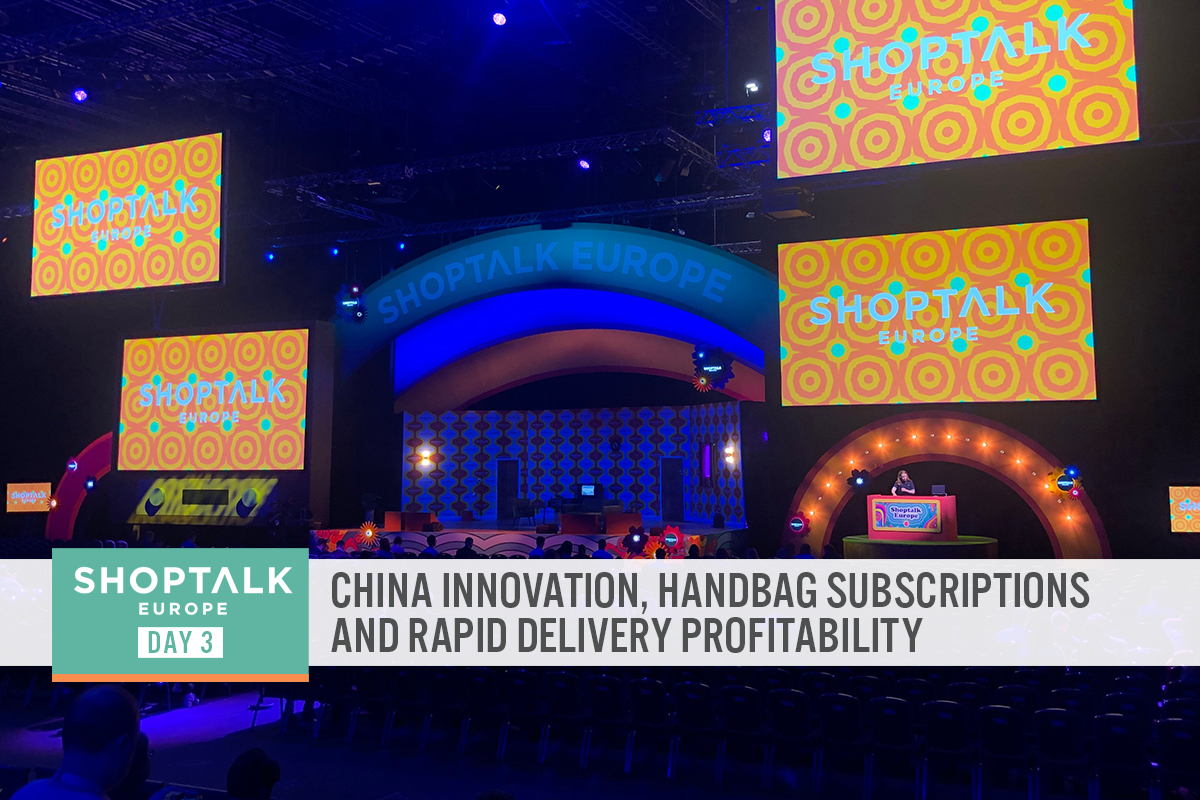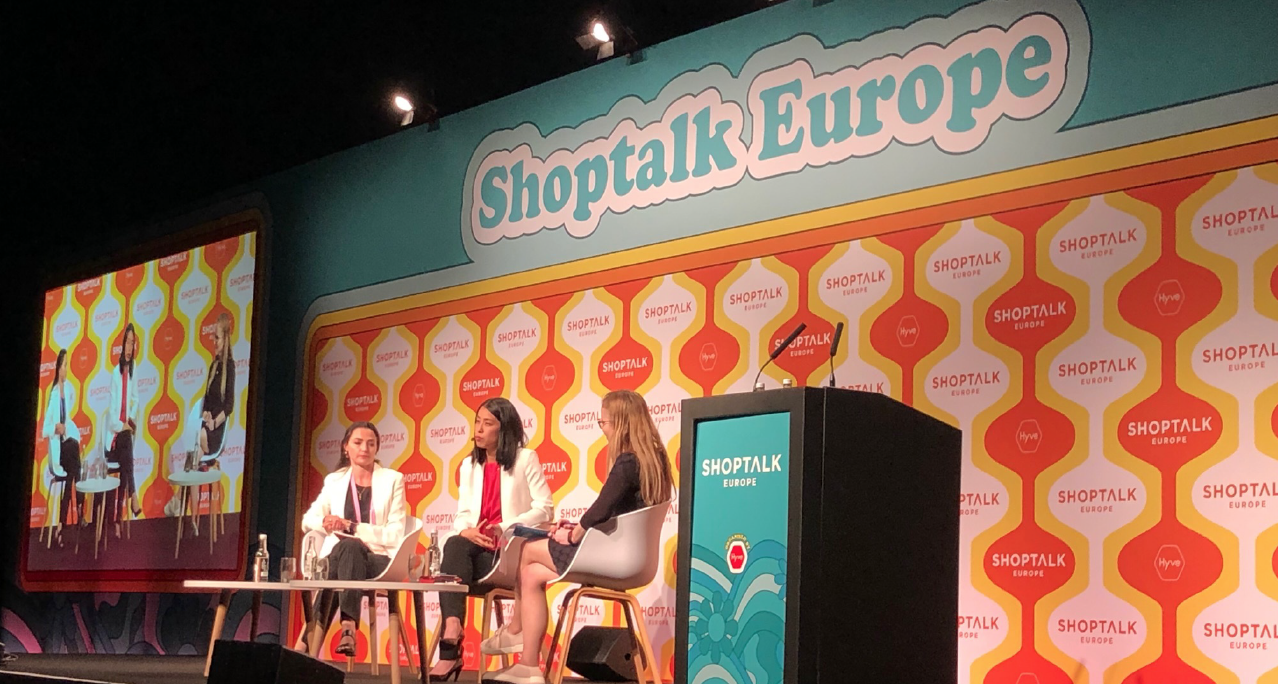
albert Chan
Introduction
On June 8, 2022, the Coresight Research team attended the third and final day of the Shoptalk Europe 2022 conference. Deborah Weinswig, CEO and Founder of Coresight Research, hosted a discussion on China and the world's most innovative retail experiences.
Shoptalk Europe 2022, Day Three: Coresight Research Insights
China and the World's Most Innovative Retail Experiences
Weinswig wrapped up the conference with a discussion with Mei Chen, Head of Fashion and Luxury UK, US and Northern Europe, Alibaba Group, and Claudia Vernotti, Co-Founder and Director, ChinaEU.
China’s consumers are young: Chen explained that consumers in China are around 10–15 years younger than those in Europe or the US, meaning replicating strategies from those regions will not work for luxury brands. Complicating matters more, consumers in China, especially young consumers, often don’t use the same apps as consumers in the West. Luxury is also different in China: it is more street-fashion influenced, combining traditional heritage with styles modern consumers want. Chen also said that Gen Zers (“post-2000” in China) are very interested in new ways of engaging, livestreaming, augmented and virtual reality and other tech-enabled ways of interacting, which brands and retailers should keep in mind while developing new strategies.
China e-commerce is platformized: In China, e-commerce platform usage is more substantial and frequent than in the West, Chen explained. Chinese users, on average, spend more than half an hour per day on Alibaba’s platforms; meanwhile, Europeans visit similar sites for a few minutes per day, if even that.
Brands and retailers must adapt: When Weinswig asked what companies should consider when looking to the China market, Vernotti noted the multitude of shopping, social media and livestreaming platforms. Companies must select the right channels and allocate a budget accordingly, as it would be near-impossible to work with all platforms. Vernotti also advised market entrants to understand China’s social and cultural context, which, she said, is sometimes underestimated, resulting in unfortunate missteps. Finally, Vernotti advised companies to “work at China speed”—the pace of implemention can be very different.
[caption id="attachment_149169" align="aligncenter" width="550"] Claudia Vernotti and Mei Chen discuss China retail with Deborah Weinswig
Claudia Vernotti and Mei Chen discuss China retail with Deborah WeinswigSource: Coresight Research[/caption]
Learnings from Other Companies on Day Three
COCOON: This luxury handbag subscription services see a 99% return rate (a positive for a subscription service), with bags loaned for an average of 26 days. Its luxury positioning belies that it is “an operation business,” Ceanne Fernandes-Wong, Co-Founder and CEO, explained. “A luxury business but an operations business—if that doesn’t work, it falls apart.” Fernandes-Wong discussed the obstacles COCOON faces in getting returns fulfilled to as high a standard as outbound delivery. Couriers tend to think that what is coming back to a company is “not good” whereas what is going out is “good,” meaning inbound deliveries are treated differently. Fernandes-Wong said the logistics industry needs to consider how they facilitate better returns.
Getir: When asked how ultrafast delivery firms can make a profit, Turancan Salur, Regional General Manager, Europe, Getir, said that companies need to control every part of the process. No aspect of Getir involves working with third parties, a process that would “leave margin on the table.” Getir buys direct, manages its own operations, hires staff and manages shifts. “If you control all of these aspects, you can have amazing customer experience, incredible stock accuracy, delivery with no substitutions and make the business profitable,” Salur explained. Meanwhile, the payback period for automation is “really long,” Salur said, and Getir would only look at automation when costs come down.
La Redoute: Each year, as part of its internationalization strategy, France-based apparel and home goods retailer La Redoute looks at which countries to focus on in the next one to three years, according to Michael Truluck, CEO, La Redoute International. Those countries then see “laser-focused” pricing, marketing and delivery options (rather than generic or overseas equivalents). Criteria for the countries include the market size, competitive landscape, demand for French fashion and home goods, similarity to France lifestyles, average wallet size and various technical elements, such as taxation rates and language.
Revlon: The beauty company is—perhaps unsurprisingly—seeing consumer behavior shift to online, pressuring department stores; however, those stores are “catching up online” and strongly cultivating an online-offline proposition, according to Charles Waters, President, EMEA, Revlon. Meanwhile, given that premium brands were traditionally reluctant to embrace digital sales channels, the impact of digital consumer habits in Asia has “changed a lot” regarding moving prestige beauty online, according to Waters.